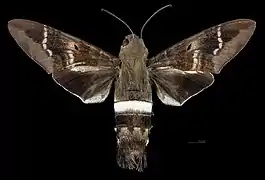Aellopos titan
Aellopos titan, the Titan sphinx, is a moth of the family Sphingidae. The species was first described by Pieter Cramer in 1777.
| Titan sphinx | |
|---|---|
.jpg.webp) | |
| A. t. titan in the Pantanal, Brazil | |
| Scientific classification | |
| Kingdom: | Animalia |
| Phylum: | Arthropoda |
| Class: | Insecta |
| Order: | Lepidoptera |
| Family: | Sphingidae |
| Genus: | Aellopos |
| Species: | A. titan |
| Binomial name | |
| Aellopos titan | |
| Synonyms | |
| |
Distribution
It has been found all the way from Maine in the United States through Central America and south to Argentina and Uruguay in South America.
Description
The wingspan is 55–65 mm. The body is dark brown with a wide white stripe across the abdomen. The wings are dark brown and the upperside of the forewing has a black spot at the end of the cell and two bands of translucent white spots. The upperside of the hindwing has pale patches along the costa and inner margin.[2]
 Male dorsal
Male dorsal Male ventral
Male ventral Female dorsal
Female dorsal Female ventral
Female ventral
Biology
Adults are on wing year round in the tropics. In the northern part of the range, adults are on wing in one generation with adults on wing from June to October. Adults feed on nectar of various flowers, including phlox, lantana and stoppers.
The larvae feed on Casasia clusiifolia, Cephalanthus occidentalis, Randia mitis, Randia monantha, Randia aculeata, Albizzia adinocephala and Randia grandifolia. There are at least two color morphs, a green and a reddish-brown form. Pupation takes place in loose cocoons in shallow underground chambers. The pupae are dark, smooth and shiny.
Subspecies
- Aellopos titan titan - Brazil
- Aellopos titan cubana (Clark, 1936) - Cuba
References
- "CATE Creating a Taxonomic eScience - Sphingidae". Cate-sphingidae.org. Archived from the original on 2012-11-08. Retrieved 2011-10-19.
- "Aellopos titan". Silkmoths. Archived from the original on 2015-06-10. Retrieved 2011-10-19.
External links
- Lotts, Kelly & Naberhaus, Thomas (2017). "Titan sphinx Aellopos titan (Cramer, 1777)". Butterflies and Moths of North America. Retrieved November 19, 2018.